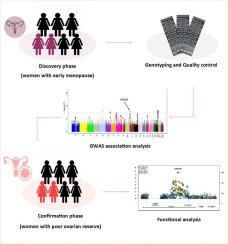Elucidating the genetic architecture of early menopause in the Tehran cardiometabolic genetic study
IF 3.6
2区 医学
Q2 GERIATRICS & GERONTOLOGY
引用次数: 0
Abstract
Background
Population studies elucidating the genetic architecture of early menopause have mainly focused on European ancestries, leaving a gap in understanding of the genetic influences in non-European populations. This study seeks to identify potential genetic variants linked to early menopause in Iranian women.
Research design and methods
We conducted a genome-wide association study on early menopause involving a discovery group of 3421 women, comprising 3145 individuals with normal age at menopause and 276 with early menopause. Additionally, a confirmation group included 1015 women, consisting of 208 individuals with a poor ovarian reserve and 807 with normal ovarian reserve, all drawn from an Iranian cohort. We analyzed over 9 million variants using the Genome-wide Complex Trait Analysis tool, followed by thorough bioinformatics evaluations and functional annotations.
Results
We identified specific genetic variants associated with early menopause, notably the rs9943588 variant of the GALNT18 gene; the variant significantly increases the risk of early menopause [OR = 1.93; p = 2.54E-8]. In our confirmatory population, this variant was associated with a 35 % increased risk of poor ovarian reserve (OR = 1.35, p < 0.0001). Furthermore, epigenomics data suggest that rs9943588 may influence a regulatory motif for the ETS transcription factor in women.
Conclusions
The rs9943588 variant of the GALNT18 gene is associated with an elevated risk of early menopause among Iranian women. Moreover, our results show significant differences in allele frequencies between Iranian and European variants, emphasizing the advantages and challenges of large-scale trans-ethnic strategies to inform personalized approaches to women's health.

在德黑兰心脏代谢遗传研究中阐明早期绝经的遗传结构
阐明早期绝经遗传结构的人口研究主要集中在欧洲祖先,在了解非欧洲人群的遗传影响方面留下了空白。这项研究旨在确定与伊朗妇女早期绝经有关的潜在遗传变异。研究设计和方法我们对3421名女性进行了早期绝经的全基因组关联研究,其中包括3145名正常绝经年龄的女性和276名早期绝经的女性。此外,确认组包括1015名妇女,包括208名卵巢储备功能差和807名卵巢储备功能正常的人,均来自伊朗队列。我们使用全基因组复杂性状分析工具分析了超过900万个变异,然后进行了彻底的生物信息学评估和功能注释。结果:我们发现了与早期绝经相关的特定遗传变异,特别是GALNT18基因的rs9943588变异;该变异显著增加早期绝经的风险[OR = 1.93;p = 2.54E-8]。在我们的确诊人群中,该变异与卵巢储备不良风险增加35%相关(OR = 1.35, p < 0.0001)。此外,表观基因组学数据表明rs9943588可能影响女性ETS转录因子的调控基序。结论GALNT18基因的rs9943588变异与伊朗妇女早期绝经风险升高有关。此外,我们的研究结果显示,伊朗和欧洲变体之间的等位基因频率存在显著差异,强调了大规模跨种族策略的优势和挑战,为女性健康的个性化方法提供信息。
本文章由计算机程序翻译,如有差异,请以英文原文为准。
求助全文
约1分钟内获得全文
求助全文
来源期刊

Maturitas
医学-妇产科学
CiteScore
9.10
自引率
2.00%
发文量
142
审稿时长
40 days
期刊介绍:
Maturitas is an international multidisciplinary peer reviewed scientific journal of midlife health and beyond publishing original research, reviews, consensus statements and guidelines, and mini-reviews. The journal provides a forum for all aspects of postreproductive health in both genders ranging from basic science to health and social care.
Topic areas include:• Aging• Alternative and Complementary medicines• Arthritis and Bone Health• Cancer• Cardiovascular Health• Cognitive and Physical Functioning• Epidemiology, health and social care• Gynecology/ Reproductive Endocrinology• Nutrition/ Obesity Diabetes/ Metabolic Syndrome• Menopause, Ovarian Aging• Mental Health• Pharmacology• Sexuality• Quality of Life
 求助内容:
求助内容: 应助结果提醒方式:
应助结果提醒方式:


